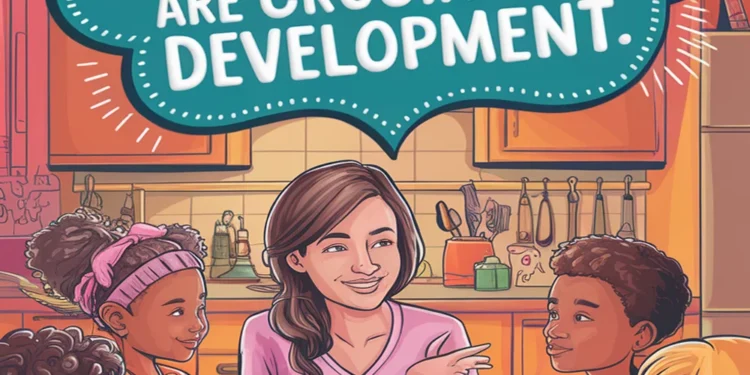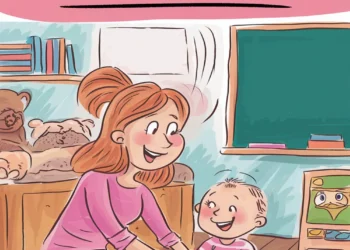Family dinner conversations are vital for your child’s development. They enhance emotional intelligence by helping kids recognize and express their feelings. Engaging discussions also foster critical thinking and problem-solving skills as they learn to analyze situations. Plus, these mealtime chats strengthen family bonds, create a sense of belonging, and improve communication abilities. Regular conversations build a nurturing environment that promotes mental well-being and resilience, all laying the foundation for future success. Discover more about the lasting impact of these interactions.
The Role of Communication in Child Development
While you may not realize it, the conversations you share during family dinners play an essential role in your child’s development. Engaging with your child in meaningful discussions enhances their language skills and vocabulary. As they listen and respond, they learn to articulate their thoughts, fostering critical thinking. Research shows that consistent family communication also strengthens emotional bonds and a sense of belonging, which are crucial for healthy emotional and social development.
Moreover, discussing diverse topics exposes your child to different perspectives, promoting open-mindedness and curiosity. This collaborative environment encourages children to ask questions, thereby setting the stage for lifelong learning. Ultimately, these dinner conversations become foundational moments that shape your child’s understanding of the world and their place within it.
Building Emotional Intelligence Through Conversation
Family dinners not only boost communication skills but also serve as a fertile ground for building emotional intelligence in children. When you engage in meaningful conversations around the table, you’re helping your child recognize and understand their own emotions as well as those of others. Discussing daily experiences allows them to express feelings, enhancing empathy and emotional regulation. Children learn to articulate their thoughts and feelings, which fosters self-awareness—a critical aspect of emotional intelligence. Active listening during these conversations encourages validation, making them feel heard and valued. Research shows that early emotional development is linked to future success in relationships and academics. By prioritizing these dinner discussions, you’re investing in your child’s emotional growth and resilience.
Recommended Items
Discover our favorite products and essentials to enhance your family conversations and bonding time!
Encouraging Critical Thinking Skills
Engaging in discussions during family dinners can greatly enhance your child’s critical thinking skills. When you encourage open dialogue, you help your child learn to analyze situations, weigh pros and cons, and form their own opinions. Ask thought-provoking questions that require them to explain their reasoning. This pushes them to think deeply and articulate their thoughts clearly.
Research shows that children who regularly engage in these conversations develop better problem-solving abilities and resilience. They learn to appreciate diverse perspectives, which broadens their understanding of the world. By creating a safe space for discussion, you empower your child to navigate complex issues confidently. Ultimately, these family dinner talks foster a mindset that values inquiry and critical analysis, setting your child up for success.
Strengthening Family Bonds
When you gather around the dinner table, you create an opportunity for connection that goes beyond just sharing a meal. This setting fosters open communication, allowing every family member to express thoughts and feelings. Research shows that regular family meals can strengthen emotional ties and promote a sense of belonging. By engaging in conversations, you reinforce your family’s values and encourage trust. This environment nurtures empathy and understanding, which are essential for healthy relationships. In turn, these familial bonds can lead to better emotional resilience in children and adolescents. So, make the most of these moments; they’re not just meals but a foundation for lifelong connections that support each individual’s growth and well-being.
Family Dinner Conversation Action Steps
Enhancing Vocabulary and Language Skills
A lively dinner table discussion can notably enhance vocabulary and language skills for every family member. Engaging in meaningful conversations helps you all practice and expand your language abilities. Here are three key benefits of these discussions:
- Word Exposure: Regularly hearing new words in context allows you to understand and incorporate them into your own speech.
- Critical Thinking: Discussing varied topics encourages you to articulate thoughts clearly and develop persuasive language skills.
- Active Listening: By actively engaging with each other, you learn to comprehend different viewpoints and respond appropriately, which further refines communication.
Incorporating these rich conversations at the dinner table isn’t just fun; it notably boosts your family’s overall language development, paving the way for improved education and interpersonal skills.
Promoting Healthy Relationships
Dinner conversations do more than enhance vocabulary; they also serve as a vital setting for promoting healthy relationships within the family. Engaging in open dialogue helps build trust and emotional intimacy, allowing you to share thoughts and feelings authentically. This connectedness fosters mutual respect, understanding, and support among family members.
| Conversation Elements | Benefits |
|---|---|
| Open-Ended Questions | Encourages sharing |
| Active Listening | Builds empathy |
| Storytelling | Creates bonding |
| Positive Feedback | Boosts self-esteem |
Understanding Different Perspectives
While family dinners often focus on sharing experiences and updates, they also present a valuable opportunity to explore different perspectives. Engaging in discussions about varying opinions enhances your family’s understanding of the world and fosters empathy. Here’s why it matters:
- Critical Thinking: When you consider diverse viewpoints, you challenge assumptions and develop stronger analytical skills.
- Conflict Resolution: Recognizing different perspectives helps you navigate disagreements with compassion and respect.
- Emotional Intelligence: Discussing experiences outside your own fosters openness, enabling better interpersonal relationships.
These conversations at the dinner table not only enrich your knowledge but also nurture essential life skills, helping every family member grow both individually and collectively. Embrace these moments; they’re vital for development.
Creating a Safe Space for Expression
Fostering an environment where family members feel free to express themselves is key to nurturing those diverse perspectives. When you create a safe space for discussion, you encourage open communication, allowing everyone to share thoughts without fear of judgment. To achieve this, be mindful of your reactions; active listening shows you value each voice. Avoid interrupting or dismissing feelings, as this can stifle future conversations. Use positive reinforcement to affirm contributions, making it clear that every opinion matters. Engaging in conversations that address both successes and challenges fosters emotional resilience. Research shows that children who feel heard develop stronger self-esteem and social skills. Prioritize this safe space; it lays the foundation for growth, understanding, and connection within your family.
The Impact of Routine on Development
Establishing a routine during family dinners can greatly influence children’s development by providing them with a predictable structure. This consistency not only fosters security but also encourages engagement in conversations. Here are three key impacts of a dinner routine:
- Promotes Communication Skills: Regularly sharing thoughts and ideas helps improve your child’s verbal abilities and confidence in expressing themselves.
- Enhances Emotional Regulation: Knowing when family dinner occurs can help children manage their emotions better, anticipating a safe space for sharing.
- Fosters Positive Relationships: Consistent family interactions strengthen bonds, allowing children to feel valued and understood.
Fostering a Sense of Belonging
Creating a welcoming environment during family dinners can greatly enhance a child’s sense of belonging. When you foster open conversations and invite diverse opinions, you help your child feel valued and heard. Research shows that children who feel they belong are more likely to develop resilience and emotional stability. Sharing stories, laughter, and experiences strengthens familial bonds, allowing your child to understand their role within the family unit. Encourage participation by asking questions that spark dialogue, reinforcing the idea that their thoughts matter. This supportive atmosphere builds trust, making it easier for them to express themselves. Ultimately, family dinners become a foundation for their self-esteem and social development, ensuring they feel connected and appreciated within your family’s narrative.
Teaching Conflict Resolution Skills
How can family dinners become a platform for teaching valuable conflict resolution skills? By creating a space where open dialogue is encouraged, you can help your family navigate disagreements productively. Here are three strategies to foster conflict resolution at the dinner table:
- Model Active Listening: Show your family how to listen without interrupting, validating each person’s feelings and viewpoints.
- Encourage Respectful Disagreement: Teach that differing opinions are natural and can be expressed without hostility. Encourage discussions that respect everyone’s perspective.
- Practice Problem-Solving Together: When disputes arise, guide your family to brainstorm solutions collaboratively instead of assigning blame.
These skills not only strengthen bonds but also equip your children to tackle real-world conflicts with confidence and empathy.
Nourishing Mental Well-Being
While many families recognize the importance of gathering around the dinner table, it’s often overlooked how these moments can greatly nourish mental well-being. When you engage in meaningful conversations, you create a sense of belonging and security that fosters emotional health. Research shows that consistent family meals can lower feelings of anxiety and depression, especially in children. These dialogues encourage self-expression, allowing everyone to share thoughts and feelings, which promotes emotional resilience. Furthermore, the routine of dinner time helps establish a comforting structure, reducing stress by providing predictability amidst life’s chaos. By prioritizing these collective moments, you not only strengthen family bonds but also cultivate a nurturing environment that supports everyone’s mental wellness. Embrace these conversations; they matter more than you might think.
Long-Term Benefits of Family Mealtime Conversations
Consistent family mealtime conversations contribute not just to immediate emotional support but also yield long-term benefits that shape individuals’ social and cognitive skills. Engaging in these discussions can positively influence various aspects of development, helping you and your family thrive over time. Here are three key benefits:
- Enhanced Communication Skills: Regular conversations improve your ability to articulate thoughts and emotions effectively.
- Increased Academic Performance: Studies show that children who participate in family discussions often exhibit better grades and critical thinking skills.
- Stronger Relationships: Frequent dialogue fosters deeper connections, leading to healthier family dynamics and emotional resilience.













